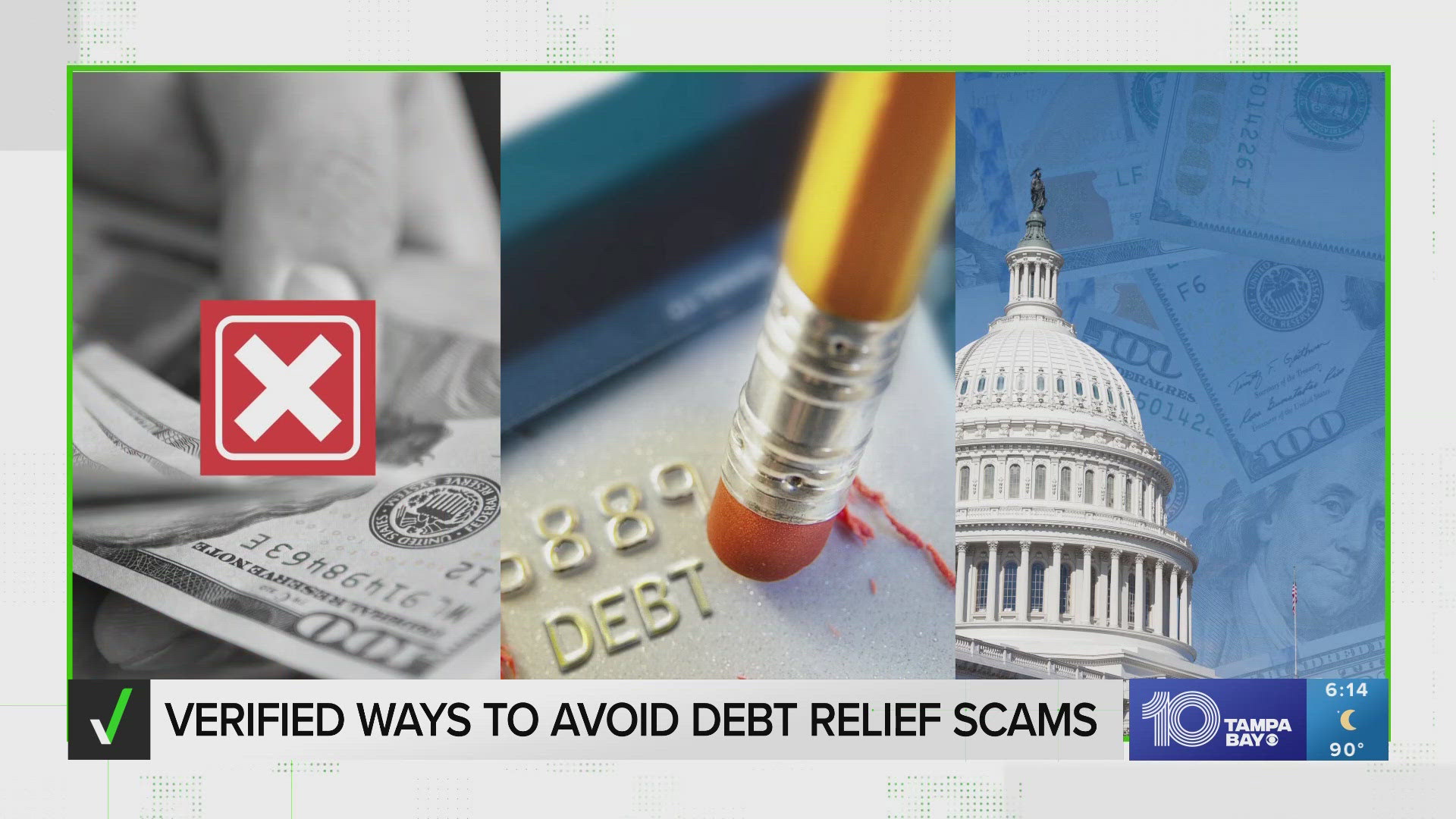Credit card debt nationwide has hit record levels as Florida ranks among states where people have the most debt.
Figures recently released by the Federal Reserve Bank of New York show Americans collectively owe $1.14 trillion in credit card debt. That’s up by about $27 billion compared to just one year ago.
Many trying to dig out from under debt seek out debt relief services, but scams are common.
VERIFY viewer Aaron C. in Tampa questioned some of the ads he’s seen for debt relief or consolidation. He emailed VERIFY asking if they’re legit and, if so, can it hurt your credit?
THE QUESTION
Are there legitimate debt relief services and can using them impact your credit?
THE SOURCES
- Better Business Bureau (BBB)
- Federal Trade Commission (FTC)
- Consumer Financial Protection Bureau (CFPB)
- Thomas Nitzsche, certified financial educator with Money Management International
THE ANSWER
Yes, there are legitimate reputable debt relief services, and using them can impact your credit score.
WHAT WE FOUND
Debt relief services vary widely – from for-profit companies that can settle your debts with creditors, to nonprofit organizations that can offer financial counseling or consolidation services to pay down your debt, according to Thomas Nitzsche with Money Management International.
“It’s really an umbrella term that can include a lot of things like consolidation, loans, settlement, debt management and even balance transfers,” Nitzsche said.
- Debt settlement companies can negotiate with creditors to pay down your debt for less than you owe. This can often come with expensive fees, according to the Consumer Financial Protection Bureau (CFPB), and can lead to late and interest penalties as debt settlement companies typically encourage you to stop paying your bills.
- Debt consolidation services will work to combine balances from multiple creditors, usually at a lower interest rate. The CFPB warns those lower rates might only be for a limited time.
- Debt counseling services can connect you with resources for budgeting and set up a debt management plan (DMP). They might get the creditor to lengthen the time you have to repay a loan or lower your interest rate, according to the CFPB.
Any impact on your credit score largely depends on which type of service you choose.
"A debt consolidation loan or a balance transfer is going to be the least impactful,” Nitzsche said. “The more aggressive forms are going to be a debt settlement… that's going to be a problem for your credit, so you're going to see some significant damage there."
Red flags to spot debt relief scams
People who are worried about credit debt are often vulnerable to fast solutions, but the Better Business Bureau (BBB), Federal Trade Commission (FTC) and Nitzche all say only time and conscientious payments will actually repair a person’s credit.
The BBB and FTC share red flags that can help people identify potential credit repair scams on their websites. These include credit repair companies that:
- Charge fees before your debts are settled
- Pressure you to pay fees masquerading as “contributions”
- Try to look like a government program
- “Guarantee” to make the debt go away or improve a credit score quickly
- Tell you to stop paying debts and communicating with creditors
- Say that you can’t get additional information without providing personal financial information
- Promise to repair your credit without actually reviewing your financial situation
- Offer a debt management plan (DMP) without teaching budgeting and money management
- Promise that they can erase bad credit or remove information from your credit reports
- Don’t explain your legal rights when they tell you what they can do for you
VERIFIED tools to help you get out of credit debt
The U.S. Department of Justice lists credit counseling agencies for people looking for debt reduction assistance.
The BBB says individuals seeking credit counseling services are protected under the Credit Repair Organizations Act (CROA). CROA prohibits untrue or misleading representations and requires certain affirmative disclosures in the offering or sale of credit repair services, according to the FTC.
Legitimate companies adhering to CROA must provide the following:
- A written contract detailing your rights and the services to be performed
- A three-day cancellation period with no charges
- Details on how long it will take for you to get results
- An accounting of all costs and fees
- Any guarantees that they are making through their marketing
If you experience an issue with a credit repair company or get scammed, you can report it to Florida's Attorney General, the FTC at ReportFraud.ftc.gov, the CFPB at bureau@cfpb.gov or the BBB at complaint@bbb.org.
VERIFY's Erin Jones contributed to this report.

